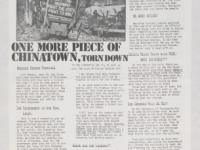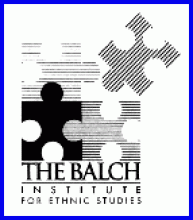Philadelphia Chinatown’s Fight for Survival: A Study of Movements for Social Justice
Philadelphia Chinatown’s Fight for Survival: A Study of Movements for Social Justice
Philadelphia’s Chinatown, long viewed by policymakers and non-Chinatown residents as a tourist destination and a place to get a good, affordable meal, is a community with a long history. In studying the history of Chinatown, students can gain valuable knowledge about a range of histories, including the history of immigration policy in the United States, the formation of ethnic enclaves in urban environments, and the role of urban neighborhoods in the development of the city.
Philadelphia’s Chinatown in particular offers additional lessons in contemporary community organizing as a means to affect social change. The resources in this primary-source activity document the evolution of a community over time and its ongoing struggle to maintain its geographic and cultural integrity. Members of this community have engaged in a wide range of civic activism—at times sanctioned by and at other times in defiance of local government.
As students investigate Chinatown’s history, they can discover the role of tradition and legacy in shaping a community’s response to struggle. They will also come to understand the role of community organizing in social change and how social change happens. Social change is a dynamic process, with disparate groups who lack power seeking unity in order to gain the strength to affect change. The materials used in this primary-source activity record the experiences of people whose lives, just for a moment in time, are altered as they pursue justice for their community. They present the complexities involved in collective action and help to humanize history for students. The efforts to save Chinatown offer a view into one way democracy works to shape our cities and our nation—a view from the ground up.
Topics
Big Ideas
Essential Questions
Concepts
- Historical comprehension involves evidence-based discussion and explanation, an analysis of sources including multiple points of view, and an ability to read critically to recognize fact from conjecture and evidence from assertion.
- Contrast multiple perspectives of individuals and groups in interpreting other times, cultures, and place
- Conflict and cooperation among social groups, organizations, and nation-states are critical to comprehending society in the Pennsylvania. Domestic instability, ethnic and racial relations, labor relation, immigration, and wars and revolutions are examples of social disagreement and collaboration.
Competencies
- Articulate the context of a historical event or action.
- Analyze the interaction of cultural, economic, geographic, political, and social relations for a specific time and place.
- Analyze a primary source for accuracy and bias and connect it to a time and place in Pennsylvania.
- Summarize how conflict and compromise in Pennsylvania history impact contemporary society.
- Contrast multiple perspectives of individuals and groups in interpreting other times, cultures, and place.
End of Unit Assessment
Have students do archival research on the issue presented in the primary source they studied. Ask them to analyze the arguments on both sides of the issue—those of Chinatown protestors as well as of those who proposed the plans Chinatown residents protested. Students should present the tactics utilized by both sides to support their position. Finally, have students decide themselves which side they would have supported and make the case for their point of view. Discuss 3 ways the “winning” argument could be displayed in today’s political environment. If one side is clearly more correct, for example, would it be better to spread their message on television? On social media sites like Facebook or Twitter?
Plans in this Unit
Grade Level
Standards/Eligible Content
PA Core Standards
CC.8.5.11-12.G. CC.8.5.11-12.H
About the Author
Debbie Wei prepared this plan for Pennsylvania Legacies: Philadelphia, China, and Chinatown,
Volume 12, number 1, May 2012. She has taught in Hong Kong and Philadelphia. She worked as the curriculum specialist in Asian Pacific American Studies in the School District of Philadelphia and was the founding principal of the Folk Arts Cultural Treasures Charter School. She is currently the Director of the Office of Multilingual Curriculum and Programs in the School District of Philadelphia.
Related
Attention Teachers!
Let us know how you used this plan and be featured on our site! Submit your story here.


